Martin Edwards's Blog, page 263
July 14, 2011
Forgotten Book - Portrait of a Murderer
Anne Meredith is not a name to conjure with in the history of crime fiction, yet this pseudonym does not deserve to have sunk into oblivion. It is one of a number of pen names used by Lucy Malleson, who is far better known as the prolific detective novelist, and creator of Arthur Crook, Anthony Gilbert.
My choice for today's Forgotten Book is the first novel she produced under the Meredith pseudonym, back in 1934. Portrait of a Murderer is, considering its date, arguably a pioneering work. There are some hints of the irony deployed by Francis Iles, but the novel has a bleakness of tone which is distinctive.
The opening section, comprising just one paragraph, is memorable – so much so that I will quote it in full.
"Adrian Gray was born in May 1862 and met his death through violence, at the hands of one of his own children, at Christmas, 1931. The crime was instantaneous and unpremeditated, and the murderer was left staring from the weapon on the table to the dead man in the shadow of the tapestry curtains, not apprehensive, not yet afraid, but incredulous and dumb."
Even though the identity of the culprit is revealed fairly early on, the story that Meredith tells held my interest throughout; at times, her approach almost put me in mind of Ruth Rendell. I don't want to say too much about the plot, as to do so would probably spoil it to some extent. But although I missed the wit that Iles often deployed, I can recommend it. Certainly, I'm very surprised that it has been ignored by historians of the genre.
July 12, 2011
On Snowdon




I rather like the well-publicised recent story of the librarian who celebrated her 60th birthday with a list of 'things to do' that were not too dramatic, but potentially very pleasurable. You won't catch me abseiling or skydiving, but indolent as I am, rather more modest targets appeal to me.
And last week, to celebrate my birthday, I achieved one long-held ambition, to go to the summit of Snowdon, the tallest peak in England and Wales and at the heart of one of my favourite areas. No, I didn't go scaling up any cliff-face. The train journey - which, through a delay, turned into a three hour round trip - was good enough for me. Mind you, scrambling up to the top from the train terminus was quite an experience, given the gale that was blowing. Luckily, I didn't fall off, and before long the mist cleared and the sun shone through.
Several crime novels have been set on mountains - Glyn Carr wrote a number, though I haven't read any of his work. I don't know anything about climbing, but I must admit I was tempted by the idea of a short story set on Snowdon, and mused on a possible plot during the journey back to Llanberis.
Getting out and about to inspiring places is good for a writer, I think, and I only wish I had more time to do more of it. But perhaps one of these days, this will be possible. In the meantime, though, the short story has to be put on hold. At present the priority is to work out the story-line for the next Lake District Mystery!
July 10, 2011
Book signings and Festivals
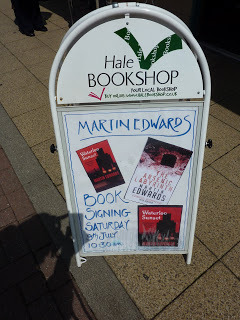
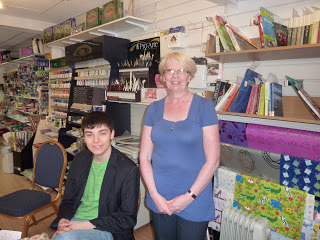
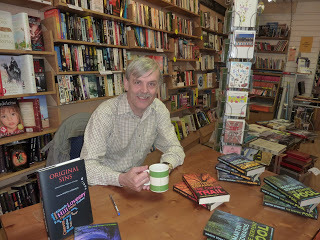
I had a good time on Saturday, signing books for customers at Hale Bookshop, near Altrincham. The shop, run by Lynne Pollitt, is a good example of a first rate indie bookstore, the type that really needs to be supported in the current climate. Use them or lose them, is the reality.
Lynn and her assistant Sam made us very welcome, and even produced coffee in an Anthony Berkeley 'Not to be Taken' mug identical to my own! I was impressed by the vibrancy of the Hale community, even in these times, which are so difficult for retailers. We talked about the possibility of a Hale Festival, and I do think that a well organised cultural festival is a very good way of binding a community together. Of course, it tends to work best in a community that's already strong, but it can work anywhere, if motivated and efficient people run it, and are willing to put in the time, almost inevitably for love rather than money.
An example is the Lymm Festival. On Friday night we went to a celebration in lovely surroundings of the tenth festival in our village. It's been extremely successful, and is now being looked on as a model for other places seeking to set up something similar. I've been lucky enough to be involved in various ways, judging writing competitions and giving talks, and it's great fun. One thing we do lack in Lymm, though, is a bookshop. So Hale has a head start, and an excellent literary hub to build cultural events around.
July 7, 2011
Forgotten Book - Crossword Mystery
You know, you just know, when you pick up a book with the title Crossword Mystery that you are in classic Golden Age territory. Yet this 1934 novel by E.R.Punshon, my choice for today's Forgotten Book, has a bit more to offer than the puzzle.
Strangely enough, the flaws of the book concern the puzzle element more than, say, the drawing of characters. The setup is unlikely, with the young policeman Bobby Owen sent to an East Anglian resort after the drowning of a prominent local resident, at the behest of the dead man's brother, who claims that it is a case of murder, but can produce no evidence. Yet Bobby joins his household, masquerading as relative. Suffice to say that it would not happen today. The eponymous crossword is not easy to solve, but the general direction in which the clues pointing is obvious. Similarly, the culprit (because, of course, it does turn out to be a murder case) is easy to spot.
Yet the book does have unexpected merits. There is a funny scene when a developer explains his plans to turn the resort into a British Monte Carlo. And there is a sobering account of life in Nazi Germany which, in 1934, must have been relatively ground-breaking. Most notably of all, the final scene is quite horrific.
A mixed bag, then. Punshon clearly had considerable ability as a crime writer, and he enjoyed success in his day, publishing more than 50 novels. Yet now he is forgotten. I suspect this is because, on the evidence of the books of his that I have read, he often struggled to blend excellent ingredients into a satisfactorily crafted whole. But this book, despite its failings, was one I was glad to read.
July 5, 2011
Play Dead
I'm a fan of Harlan Coben, especially of Tell No One, and I reckoned audio books would be a good way to enjoy more of his work. as he is strong on both snappy dialogue and plot. I still think it's a good plan, but unfortunately I picked Play Dead, which he wrote when he was learning his craft. Coben warns the reader, very honestly, in a foreword, that this is a tyro effort, but I rather assumed this was simple modesty on his part.
In fact, there are good things in Play Dead - an intriguing set-up, and plenty of plot twists, for sure. A couple of newlyweds who seem to have it all have their lives turned upside down when the husband mysteriously disappears and is presumed drowned. But is he really dead? It seems not - so what is going on? For someone interested in the craft of writing, it's also quite intriguing to see an apprentice effort before a talented novelist got into his stride.
Regrettably, the downsides outweighed the upsides as far as I was concerned. Having gone to the trouble of undergoing plastic surgery, the missing man behaves so as to make it certain his secret will be found out. I waited patiently for an explanation, but none was forthcoming. And all the characters are either impossibly good-looking, impossibly talented or impossibly bad. If the story had been condensed into a couple of hours, it might have worked, but six hours was very heavy going.I didn't give up on it, but I did groan several times.
None of this affects my admiration for Coben at his best. But I'm not sure why he allowed this book to see the light of day. Trust me, my own first novel will remain unpublished, and a good thing too!
July 4, 2011
The life of a writer
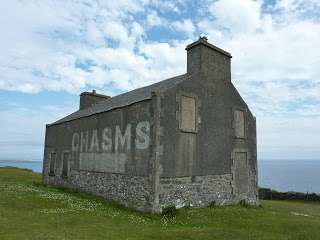

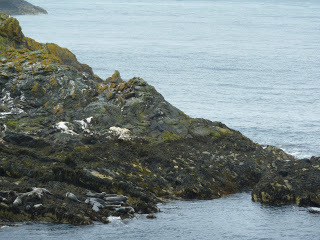

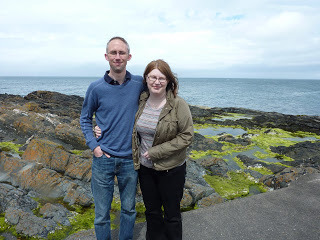
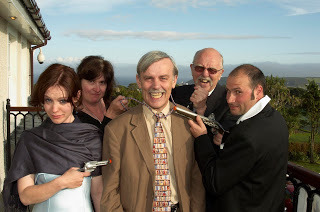
The life of a writer has its ups and downs, but what life does not? Overall, it is an enormous privilege to be a published novelist, and there are many incidental pleasures to the lifestyle (which I've never been able to pursue full-time, but I'm sure that one day it will happen...)
Last week I mentioned my trip to the Isle of Man. Here are one or two photos from that splendid place, taken on my tour with Chris and Jo Ewan. The Chasms, splits in the cliff rocks, fascinated me, as did the seals basking on the Calf of Man. And I've also included the publicity shot from the Victorian mystery event. The actors, by the way, were excellent, despite their murderous intent. Very enjoyable performances.
After one visit to the Isle of Man, I was inspired to write a short story set in Peel called 'Sunset City', and trips like this do tend to give a writer fresh inspiration. As well as a lot of good times.
Paul Beech has kindly mentioned the talk I gave last Monday at the Lymm Festival. This was very different from the night in Douglas 48 hours earlier, but equally good fun from my perspective. The Festival has proved a great success for the past ten years, and I'm delighted to have been part of it this time around.
July 3, 2011
Scott and Bailey - series review
Scott and Bailey has just finished what I suspect will be the first of a number of series. I'm glad I stuck with it, because it does offer something fresh in TV cop shows. It's not just that the three lead characters are all women cops - though the female slant to the story-line is key to its success. But the flavour of soap opera is never far away. And what that means is that although some things in the series are a bit irksome, at times it all makes for quite compelling viewing.
The demands of the story meant that Rachel, the brilliant but wayward young DC, behaved quite stupidly at times, while her older and wiser colleague wavered between staying with her nice but boring husband and going off with a more exciting yet rather dodgy colleague. While their boss,Jill Murray, was a bit manic at times.
Yet the quality of the acting by Suranne Jones, Lesley Sharp and Amelia Bullimore was very good, even better than the quality of the writing, which was certainly very capable. The plots weren't bad, either, and the odd implausibility was, I thought, definitely forgivable. After all, there are many classic crime stories with implausible elemeents. Overall, I really enjoyed the show and look forward to more in the future.
June 30, 2011
Forgotten Book - Poison in the Parish
My choice for today's Forgotten Book is another novel by the unjustly neglected Millward Kennedy – this one is Poison in the Parish, which was first published in 1935. It opens with a rather aggressive dedication to an un-named person who has complained that Kennedy peoples his work with unpleasant characters. Here, Kennedy says, is something rather different. The suspects are all relatively agreeable people.
The book then begins with an extract from a letter which is tantalisingly described as a "prologue or epilogue" before the story proper gets underway. Following gossip in a small village, the police have exhumed the body of a rather nasty old lady who turns out to have been poisoned with arsenic. In order to get a handle on life and relationships within the village, the police – rather improbably, it must be said – call upon a wealthy invalid to assist their enquiries.
The invalid is called Francis Anthony, and I am as sure as I can be that Kennedy chose the name deliberately as a tribute to his friend and colleague by taking the first names of his two most famous pseudonyms, Anthony Berkeley and Francis Iles. The book is in many ways a homage to Iles, especially in its ironic flavour, and one of its main features is a very unusual murder motive which later found its way (in the context of a very different storyline) into Anthony Berkeley novel.
I figured out what was going on in the story at an early stage, partly because aspects of the narrative reminded me of a book that Agatha Christie wrote early in her career. But this did not spoil my enjoyment of the mystery, which is pleasingly put together. I'd say this is one of Kennedy's most entertaining novels, and a reminder of his talent. It's strange to think that he produced only a handful of novels after this one. Perhaps his disastrous experience with the law courts over a libel claim, which I discussed in this blog recently, provides the explanation.
June 29, 2011
Best Eaten Cold
I'm delighted to announce that the History Press will be publishing the second Murder Squad anthology of short stories which I have edited in the summer – probably around August. The collection takes its title, Best Eaten Cold, from a story by Stuart Pawson, and many of the stories have some form of revenge or payback at their heart. They also, by and large, have settings in the North of England.
The well-known critic Barry Forshaw has been kind enough to contribute a foreword, and apart from myself and Stuart, there are stories from three of the other five original members of Murder Squad. I'm particularly glad to say that one of the stories written by Ann Cleeves features DI Vera Stanhope, fresh from her recent television series.
Here is a list of the stories (not in the order in which they will appear in the book) - as always, it's been great fun to work on an anthology project with a group of friends of long-standing who also happen to be terrific writers.
Ann Cleeves The Habit of Silence
Ann Cleeves Basic Skills
Ann Cleeves Mud
Martin Edwards The People Outside
Martin Edwards InDex
Martin Edwards The Case of the Musical Butler
Margaret Murphy The Message
Margaret Murphy Act of Contrition
Stuart Pawson Sprouts
Stuart Pawson Best Eaten Cold
Cath Staincliffe Boom
Cath Staincliffe Laptop
Cath Staincliffe Riviera
June 26, 2011
The Isle of Man
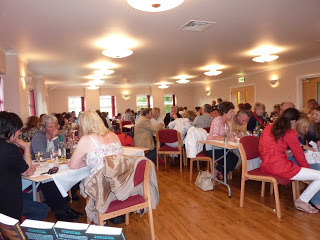
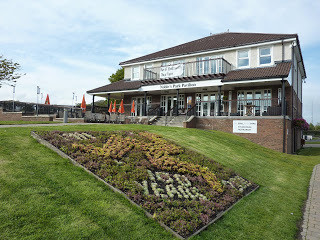
Just back from a wonderful week-end in the Isle of Man. This is only a short post, as I have yet to prepare fully for a talk I'm giving tomorrow at the Lymm Festival, but I must just say how much I enjoyed my trip to the island.
Thanks to a recommendation from Chris Ewan, I was asked by Douglas Library to present my Victorian murder mystery event, and I must say that Jan Macartney, her colleagues Sue and Sharon from the library, and a great team of performers made it an evening to remember. The event was a sell-out, and a few people who turned up on the night had to be turned away as the Noble's Park Pavilion, where the event was held, was full to overflowing. I'll be honest, packed houses are rare in my career, so this was one to cherish!!
There were a few distinctive features to the evening. Usually, I give a talk at these events, but this time there was a Q and A session with Bob from Manx Radio, which seemed to go really well. And it was good to see Douglas Stewart and his family in the audience. Douglas, like Chris and me, combines a lawyer's life with that of a crime writer's.
Mind you, Chris is currently writing full time, and his is a name to watch as far as crime fans are concerned. Trust me, he will make it big in the future. It was a real treat to spend time with him and his wife Jo; very generous with their time, they took me around the island and proved to be perfect companions.



